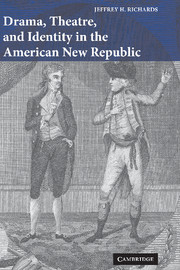Book contents
Introduction
Published online by Cambridge University Press: 22 September 2009
Summary
Although the outline history of drama and theatre in early America has been told before, with the exception of Royall Tyler's The Contrast, relatively little has been said in detail about the particular plays or performances that graced – or disgraced – the stages and pages of American theatres and notebooks in the early republic. It might be a stretch to call the citizenry of the incipient United States a theatre-going nation in 1775; it would be considerably less difficult to say so in 1825. Yet in either case, plays and stage performances seemed to occupy some part of the consciousness of many men and women, certainly the seaboard elite, but additionally a number of people not restricted to the wealthy and educated. The Continental Congress during the Revolution thought it best to proscribe theatrical amusements, but the British military on American soil asserted the opposite, launching seasons in New York, Boston, and Philadelphia when they occupied those cities. After the war, debates ensued in many areas about the appropriateness of resuming stage entertainments in a republic – were they not the delight of the late oppressors of the land? But except in Boston, the forces for restoring theatre prevailed in relatively short order. By 1790, nearly every coastal city of size, as well as many smaller towns and such inland locales as Richmond, had some professional or semi-professional theatrical troupe performing in public venues.
- Type
- Chapter
- Information
- Publisher: Cambridge University PressPrint publication year: 2005



